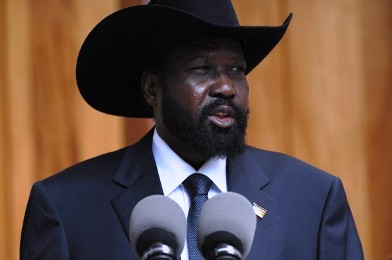South Sudan’s Kiir says ruling party split inevitable
September 15, 2015 (JUBA) – South Sudanese President Salva Kiir, also the chairperson of the country’s ruling party (SPLM), observed that the peace accord where by power will be shared by three party factions meant the division in the party was inevitable.

“The realities of our political differences within the SPLM which happen in 2013 managed to surface clearly again in the signing of the compromise peace agreement,” said Kiir, who did not take questions from journalists after reading a prepared speech.
The conflict, which was meant to end with the signing of a peace agreement last month started on December 15, 2013 following intensive power struggle between President Kiir and his former deputy Riek Machar for the leadership of the ruling SPLM party.
A dozen SPLM leaders were detained at the onset of the conflict, including the party’s secretary general, Pagan Amum. They were released four months later and went on to form a third bloc known as the SPLM former detainees. The government, rebels led by former vice president Machar and former detainees will have 53%, 33% and 7% of executive powers at the national level respectively. The rest will go other political parties.
President Kiir said the agreement, mediated by regional bloc, the intergovernmental governmental authority on development (IGAD), has divided the SPLM party and the entire country.
“This IGAD prescribe peace document on the resolution on the conflict in the Republic of South Sudan is the most divisive, unprecedented peace deal ever in the history of our country and the African Continent at large,” he said.
The objectives of the Arusha Agreement, he said, have unfortunately been “under-mined” by some clauses of the IGAD agreement. He was referring to the Tanzanian and South African-led SPLM reunification deal signed in January this year in Arusha, Tanzania. The accord reinstated all members of the SPLM, including Machar and Amum to their positions in the SPLM. Amum was in July reinstated as the party’s secretary general.
President Kiir insisted that the SPLM should remain one if the accord was to be fully respected.
“It must be stated clearly that the reality of political differences within the SPLM, which has been cemented in the peace agreement and accepted fully by our colleagues in the opposition, required all of us to reorganize ourselves on a new bases. This simply means that SPLM will never be one again as long as we follow the implementation of this compromise peace agreement,” he stressed.
Meanwhile, Kiir hinted on new changes to be made in the SPLM, reiterating his earlier fears for possible disintegration of the former guerrilla movement on the basis of the IGAD mediated accord made “with full consent of our brothers; the former detainees.”
“The methods for the selection and distribution of the national ministries among the three groups of the SPLM as stipulated in the agreement on the resolution of the conflict in the Republic of South Sudan does not reflect the sprite of members of one party who abide by common principles and discipline as enshrines in the SPLM constitution including the rules and regulations of the party,” said the South Sudan leader.
The Sudan People’s Liberation Movement was formed after the outbreak of Sudanese civil in 1983 by John Garang, who died twenty one days after becoming the first vice president of Sudan in accordance to the 2005 Comprehensive Peace Agreement (CPA).
Later on, Kiir took over and became the president of the new country in 2011 when South Sudanese voted for independence, a plebiscite promised in the CPA. Disagreement in SPLM over leadership styles and democracy are common. In 1991, Machar, the current leader of the SPLM in Opposition (SPLM-O), broke away from the late Garang. Disagreements over the ascension to SPLM leadership is blamed for causing the war, which was to end through the peace deal, where Machar becomes first vice president.
(ST)
